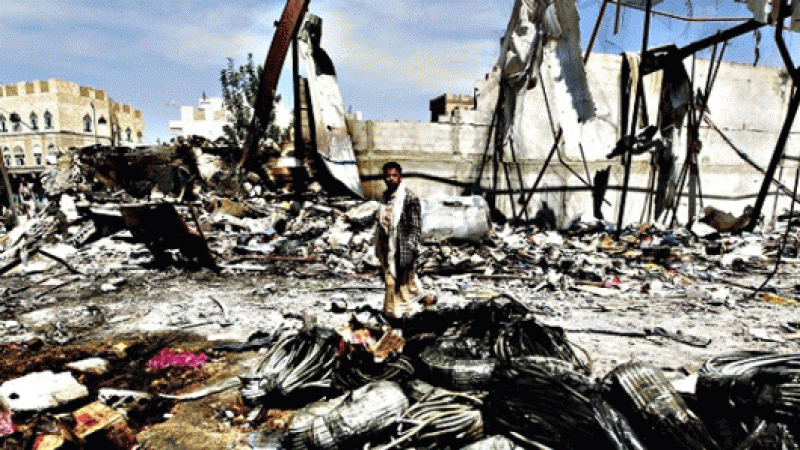
By Karen McVeigh
Saudi Arabia’s investigation of its own alleged humanitarian law violations in Yemen is “like marking your own homework”, said the former UK international development secretary Andrew Mitchell.
Mitchell, recently returned from Yemen, told MPs that an independent investigation of alleged abuses during the two-year conflict was necessary to maintain credibility and the rule of humanitarian law at a time when such law was under “extraordinary pressure”.
Yemen is one of seven countries subject to a White House executive order banning citizens of Muslim majority countries from entering the US.
The Ministry of Defence is tracking 252 allegations of humanitarian law violations by the Saudi-led coalition in Yemen, according to a BBC report last week.
At a hearing on Yemen’s ongoing humanitarian crisis by Britain’s international development committee on Wednesday, Mitchell was asked if the time had come for a fully independent investigation.
“I completely understand why we have said in the first instance the Saudis should investigate these allegations,” Mitchell said. “But in the end if you stand back, such investigations are only likely to carry credibility if they are seen as independent. I don’t want to belittle the issue but it’s like marking your own homework. The wider community won’t believe a one-sided investigation by the people who are the alleged perpetrators and I think that has to be carefully borne in mind.”
Mitchell said that, with international humanitarian law under extraordinary pressure, all who believe in the established system and want to see it “built up and not degraded” would recognize “the importance of having an independent and credible investigation of these breaches”.
The Saudi-led coalition’s investigative mechanism, the Joint Incidents Assessment Team (JIAT), has released the initial results of investigations into 14 coalition attacks, according to a Human Rights Watch report published in January. HRW and Amnesty International expressed concern that JIAT investigations are falling short of international standards of transparency, independence and impartiality.
The British government, which has licensed £3m worth of arms to Saudi Arabia, has said the Saudis must conduct an investigation into allegations of humanitarian breaches.
Under UK arms rules, weapons must not be exported if there is a “clear risk that the items might be used in the commission of a serious violation of international law”.
A three-day court hearing over the legality of UK arms exports to Saudi Arabia is due to begin next week, after the Campaign Against Arms Trade won the first round of a legal challenge in June.
In November, the UK Foreign and Commonwealth Office in Yemen, even though it admitted UK defense personnel “cannot form a complete understanding” due to a lack of information.
In a response to the recommendations of two select committees, the government has rejected the need to suspend arms sales pending a UN-led investigation of violations by all parties in the conflict.
Mitchell said he was not in favor of an arms embargo to the Saudis because they would get the weapons “in any event” and that Britain “retains some influence by dint of having sold them the weapons in the first place”.
Asked if he was satisfied that enough consideration is being taken of humanitarian considerations in the arms export license regime, Mitchell said: “We do have the toughest export licensing regime in the world by some way. When I had responsibility or partial responsibility in this area, I was certainly very conscious that that was true.
“We have the judicial review coming up any time now and it will be interesting to see what the courts decide in the light of what they have heard.”
Mitchell, who was the first British politician to visit Yemen in two years, described it as a “forgotten crisis” and warned that the malnutrition was increasing.
He has pointed out the inconsistencies in Britain’s policy in Yemen, on the one hand supporting the Saudi-led coalition while on the other giving millions of pounds in aid.
The Department for International Development had tried to get food and aid through the port of Hodeida.
“The efforts to get shipping in there are intensive,” said Mitchell. “And yet, we are also loosely part of the coalition that is bombing Hodeida and which has disabled the five cranes which are essential for unloading the vessels that another limb of the British government is trying to getting into the port.”
Coalition strikes on the port have been condemned by the UN as a clear contravention of international humanitarian law. According to the UN, airstrikes by the Saudi-led coalition have been responsible for 60% of the 2,067 civilian deaths in the conflict over a year from 1 July 2015.
On Tuesday, the UN children’s agency, Unicef, said that Yemen had lost decades worth of gains in public health as a result of war and economic crisis, with an estimated 63,000 children dying last year of preventable causes linked to malnutrition.
Source: The Guardian, Edited by Website Team